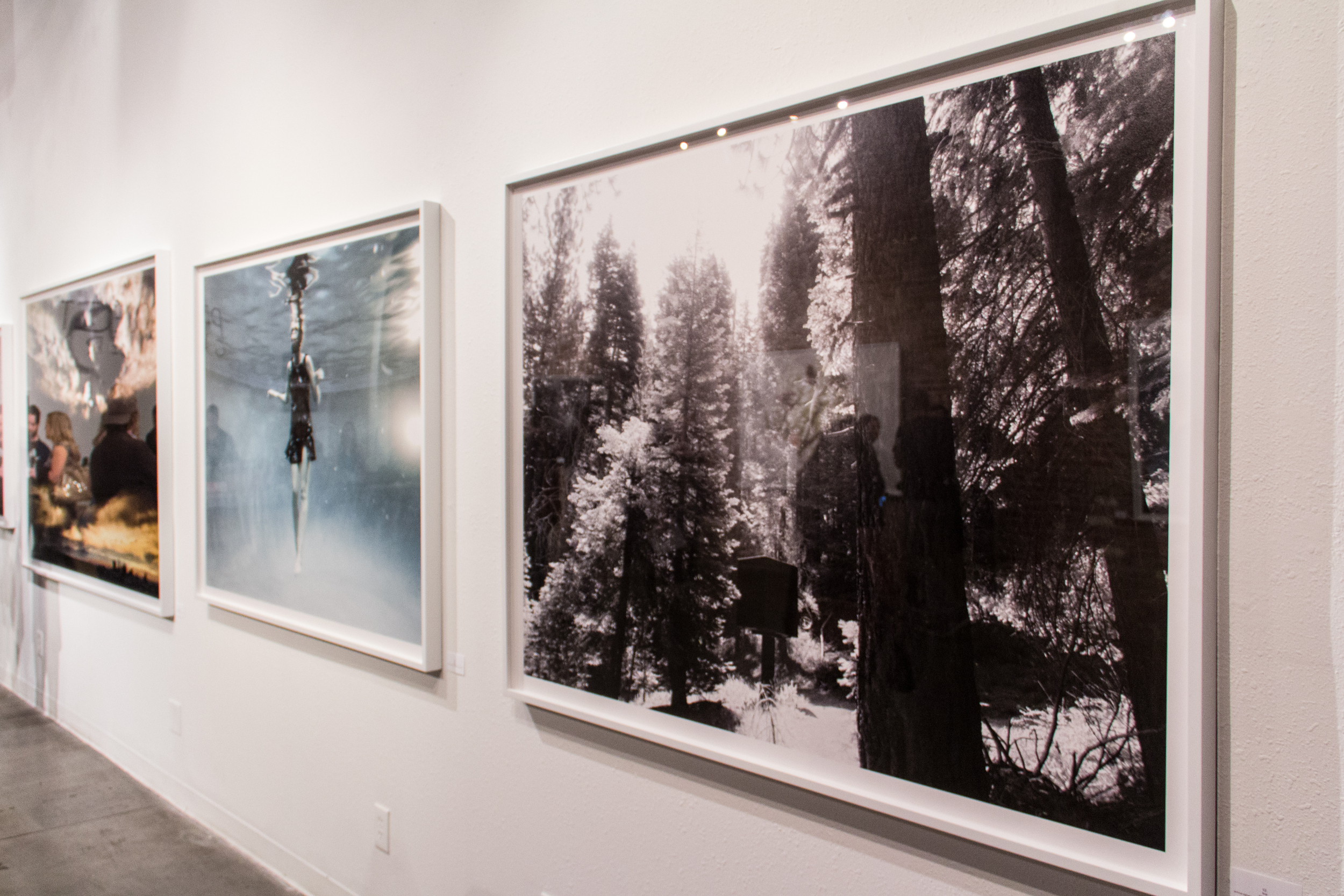
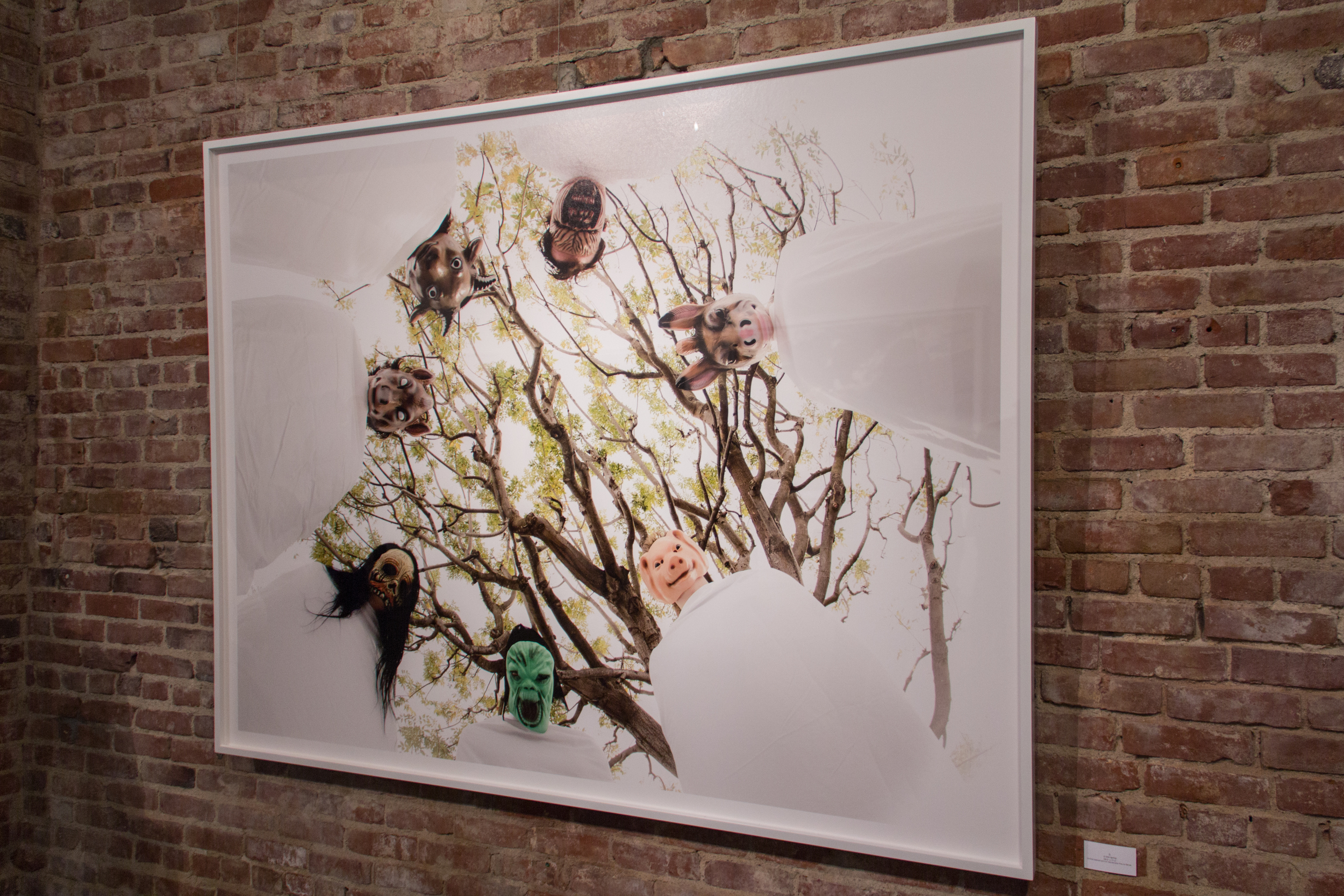
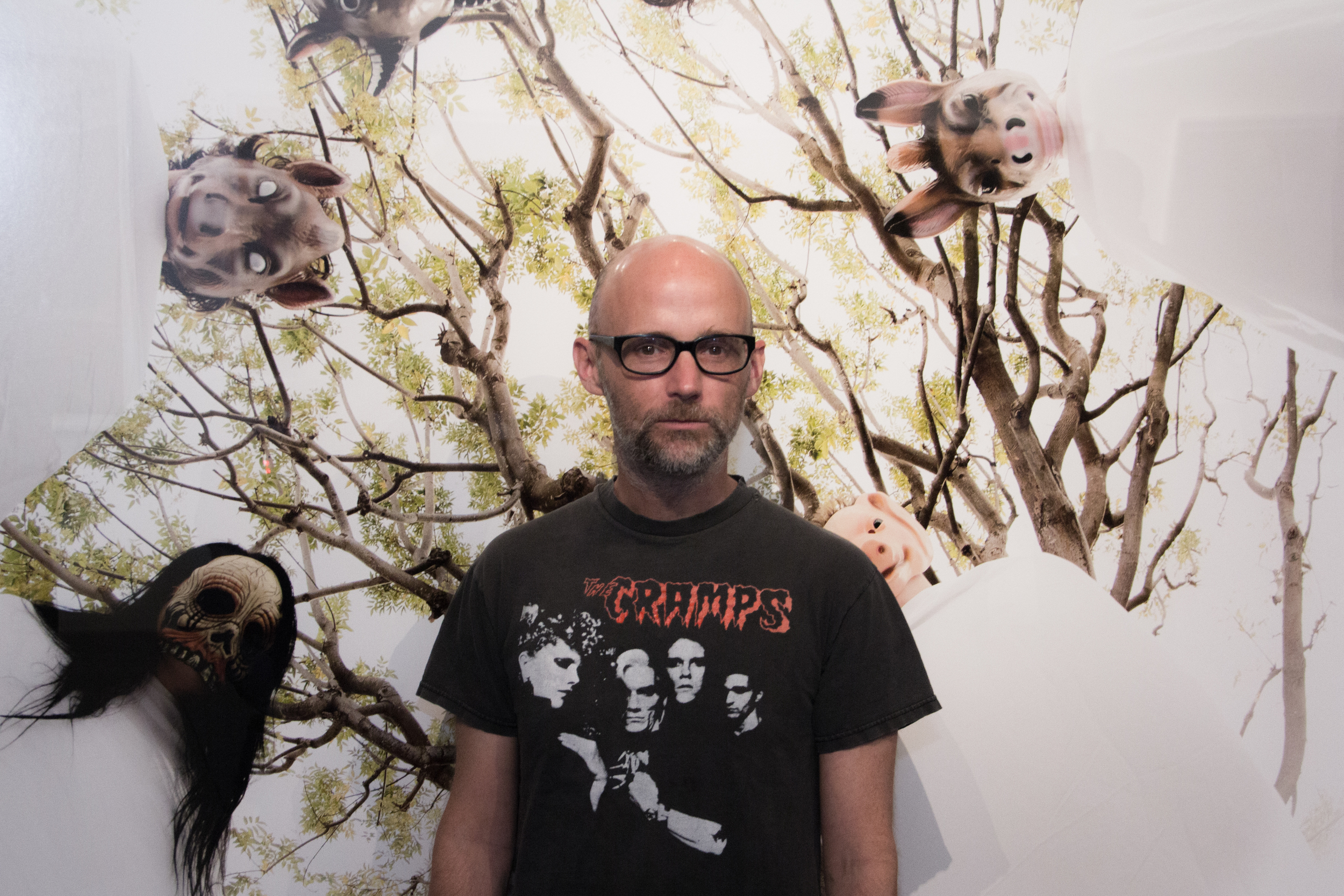
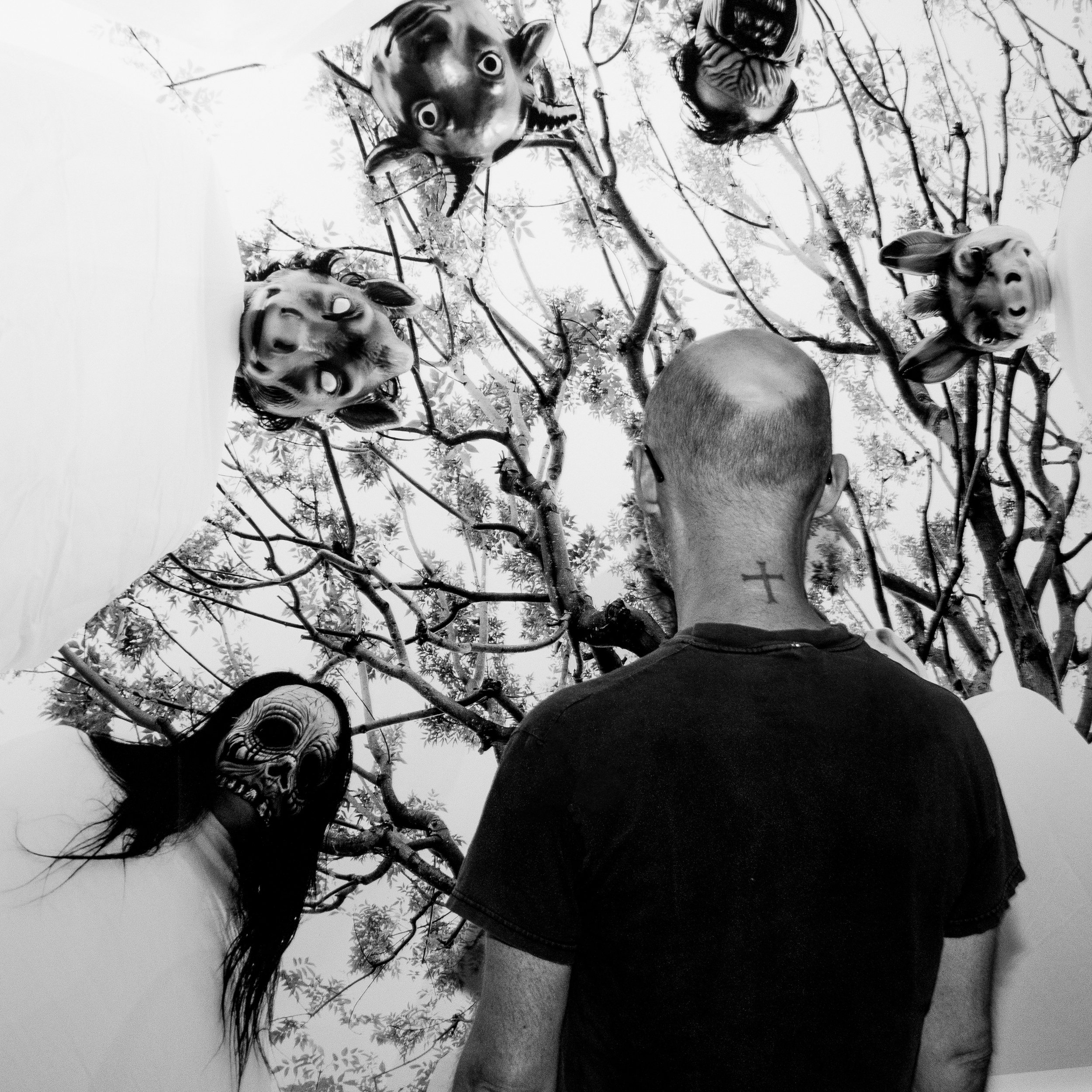
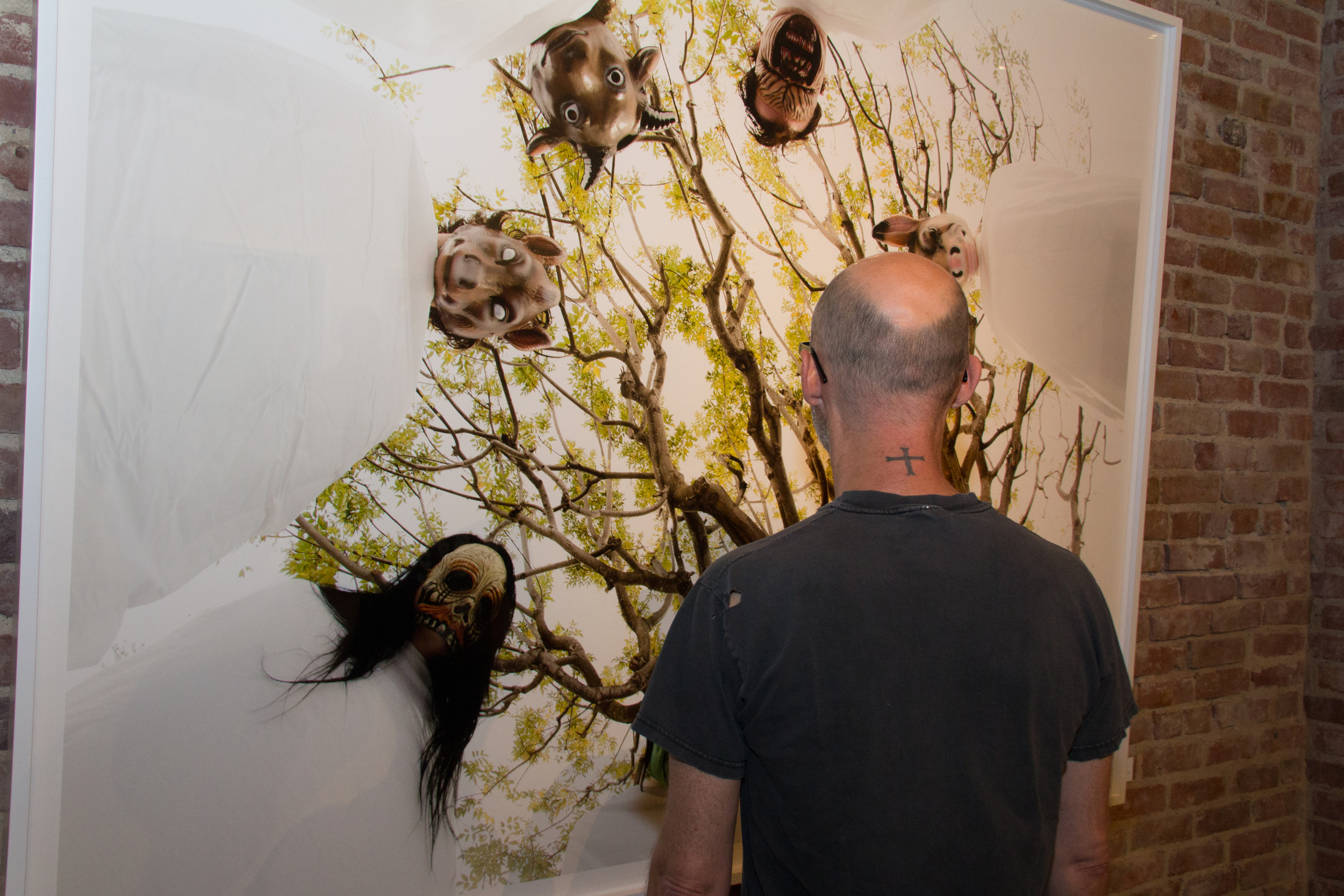
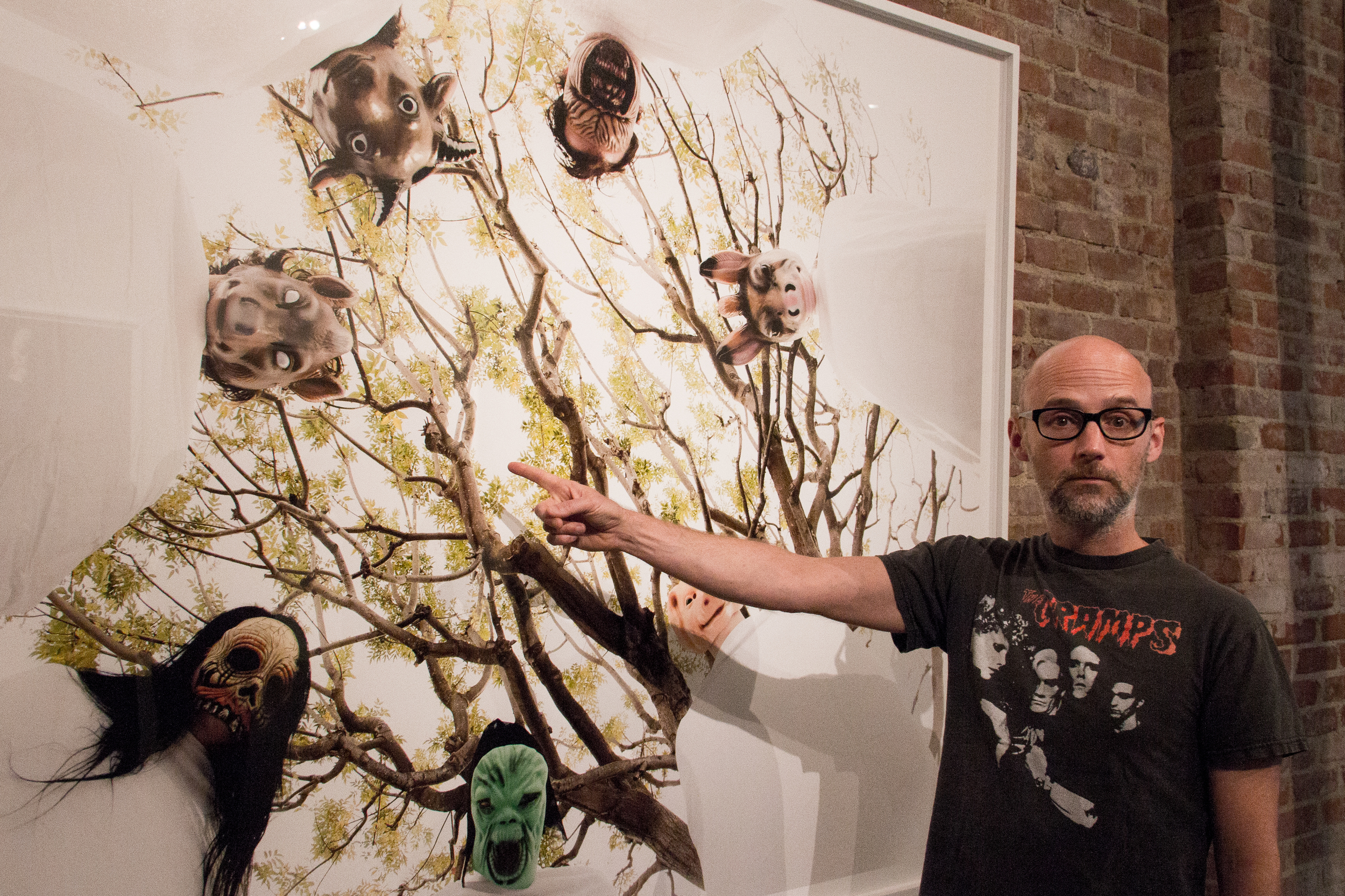
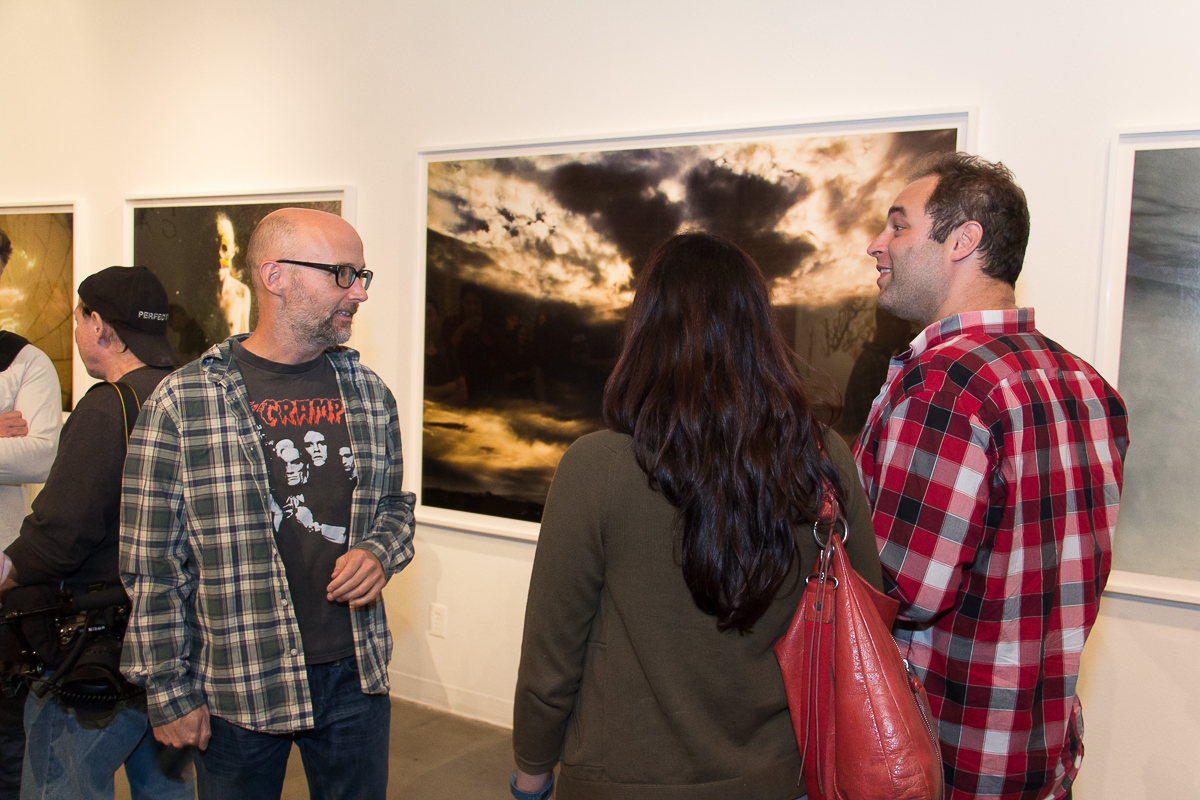
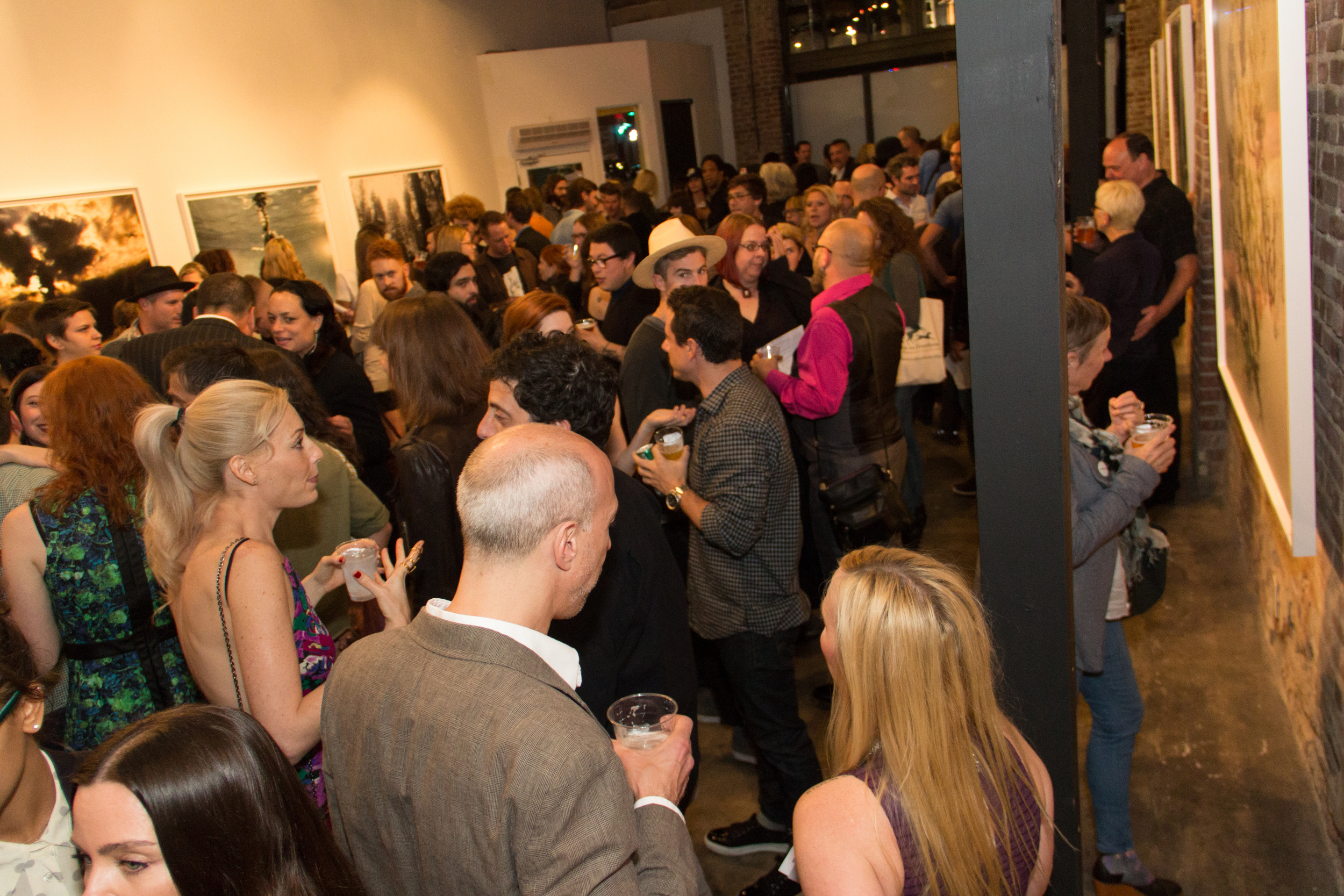
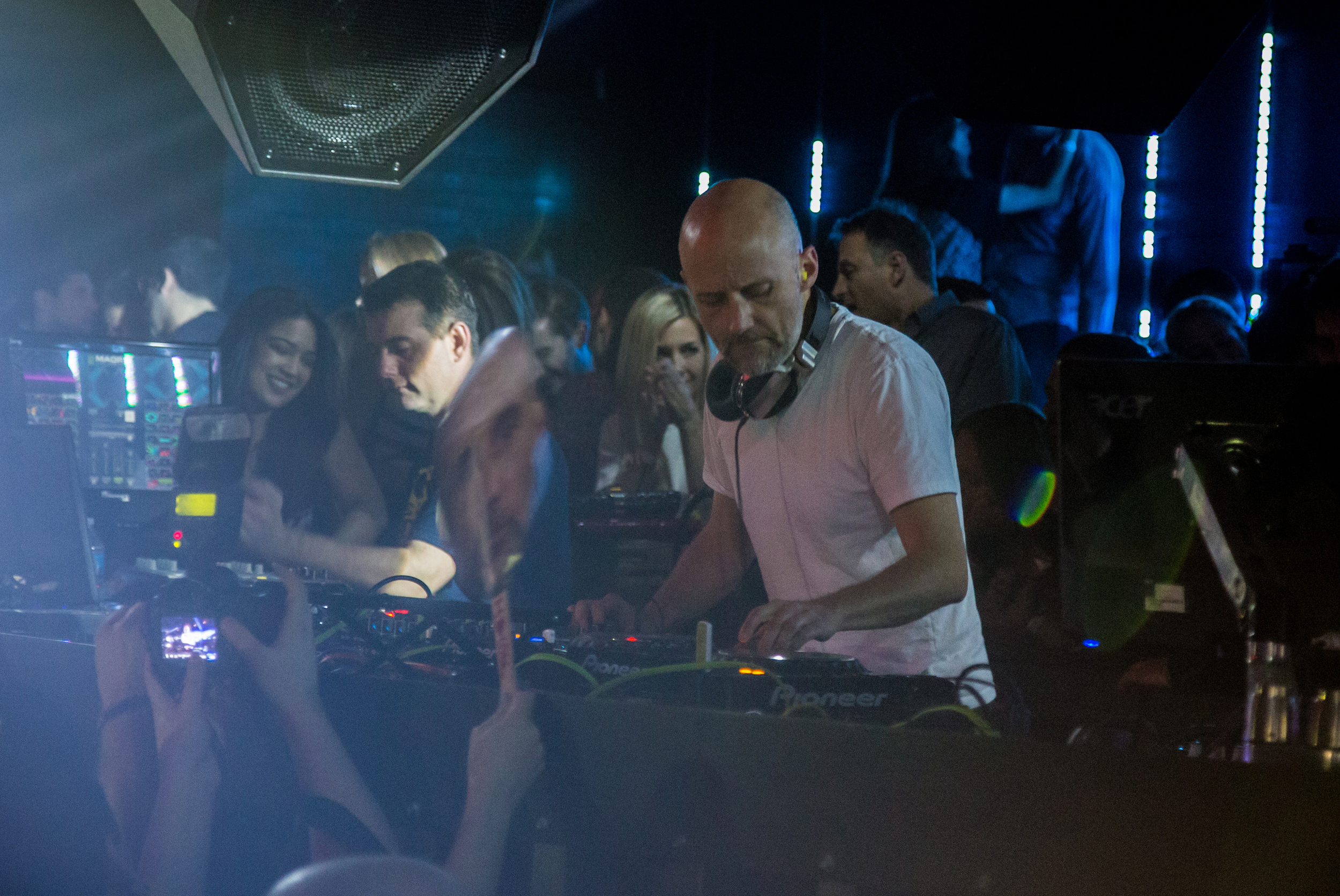

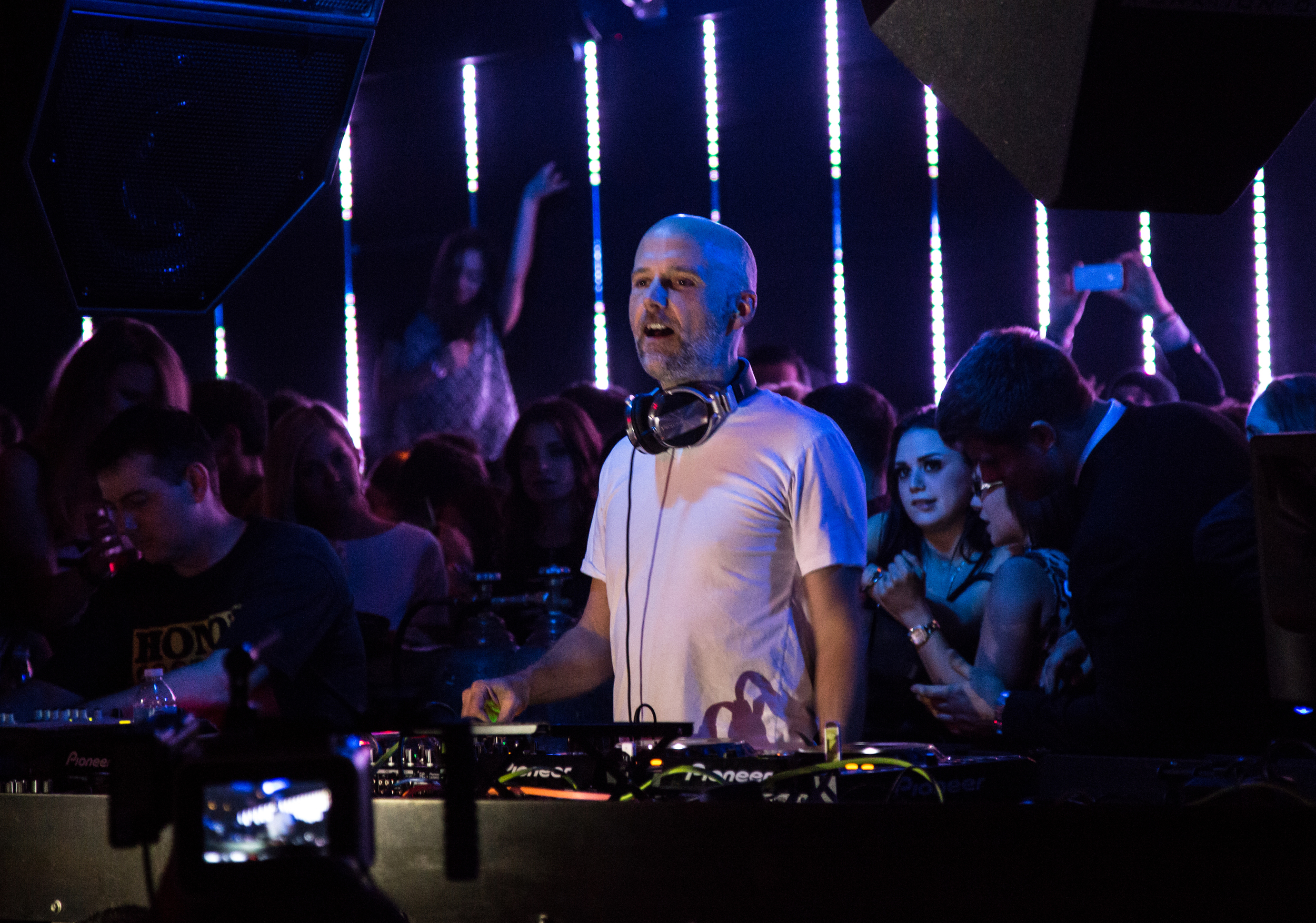
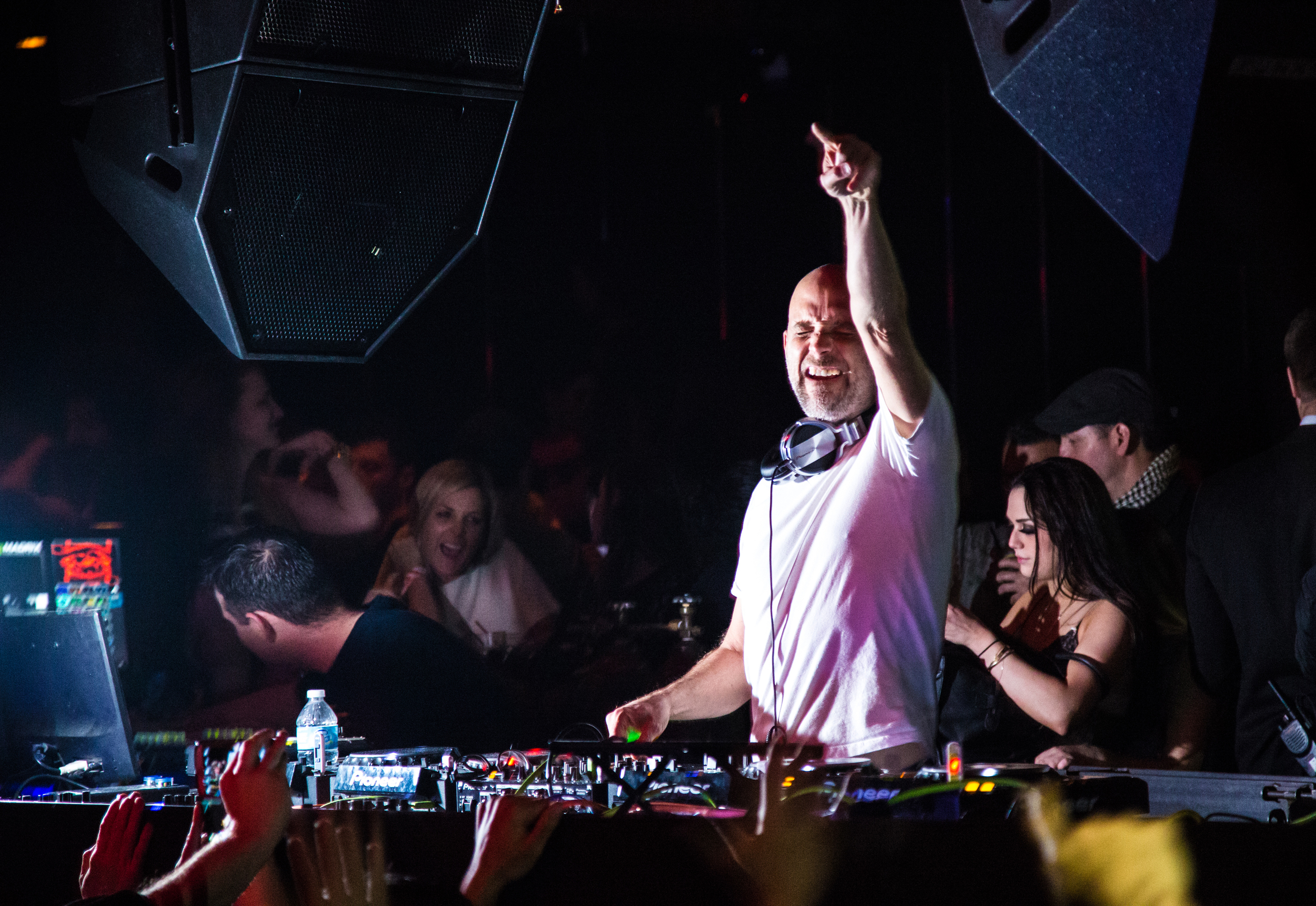
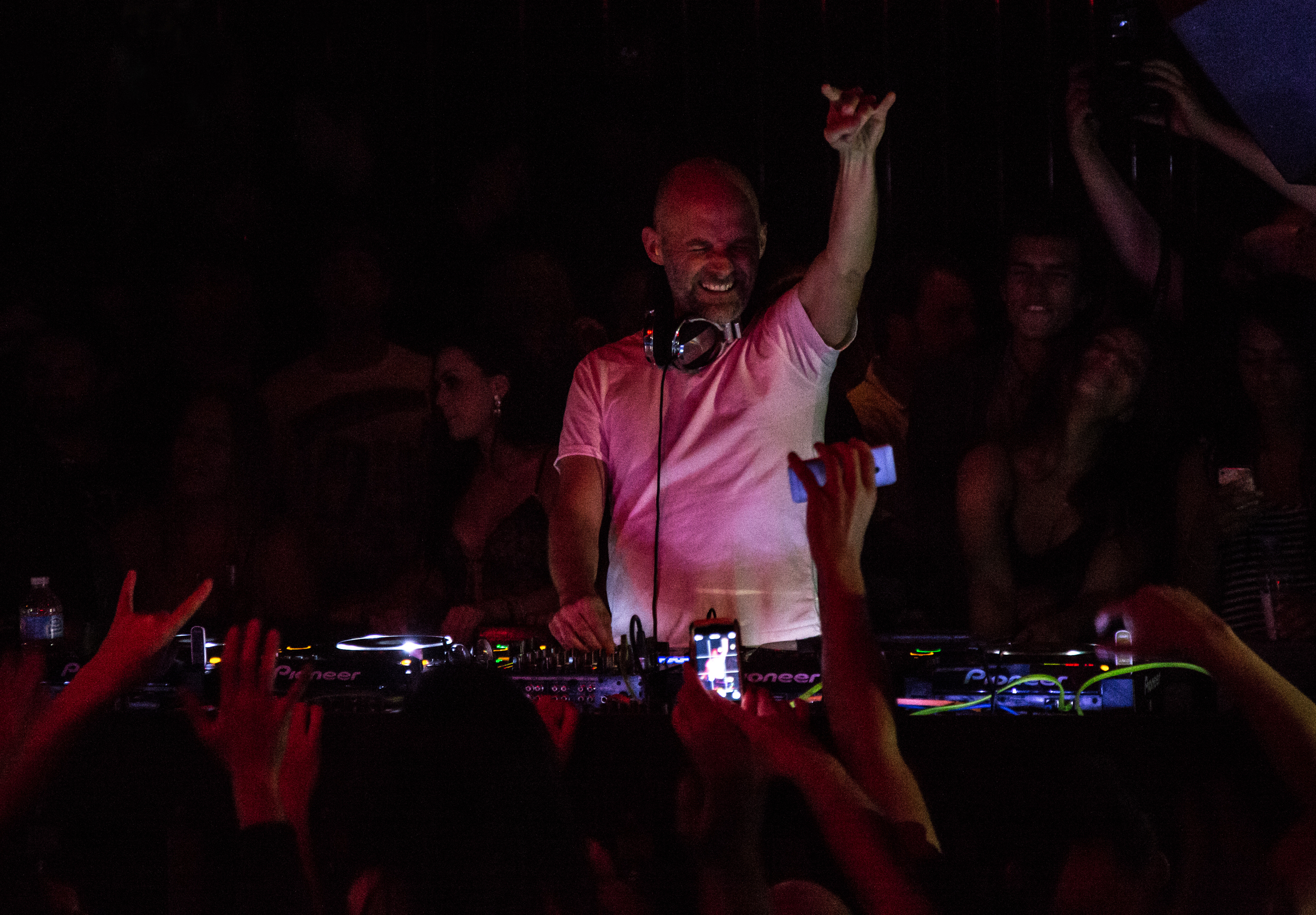
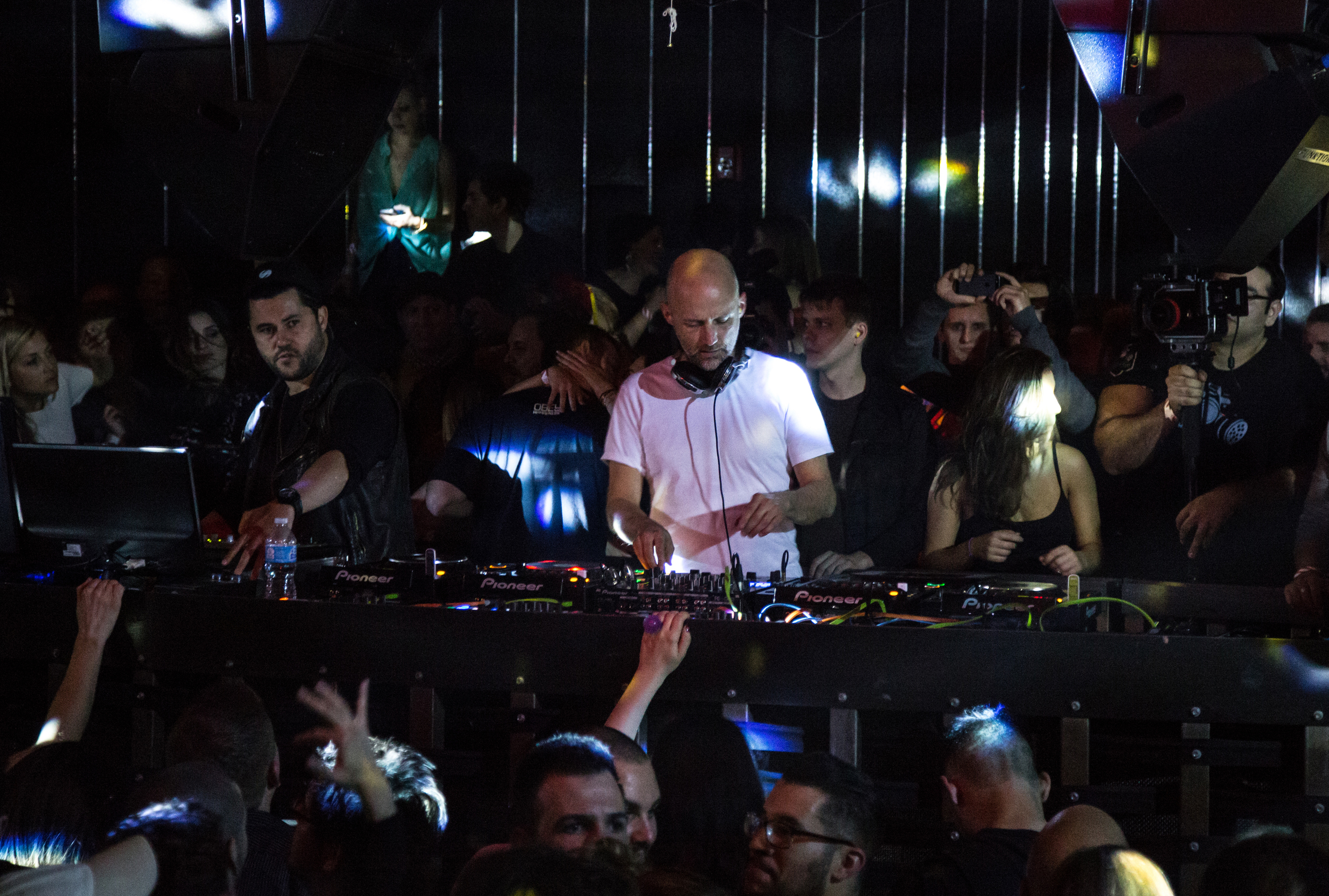
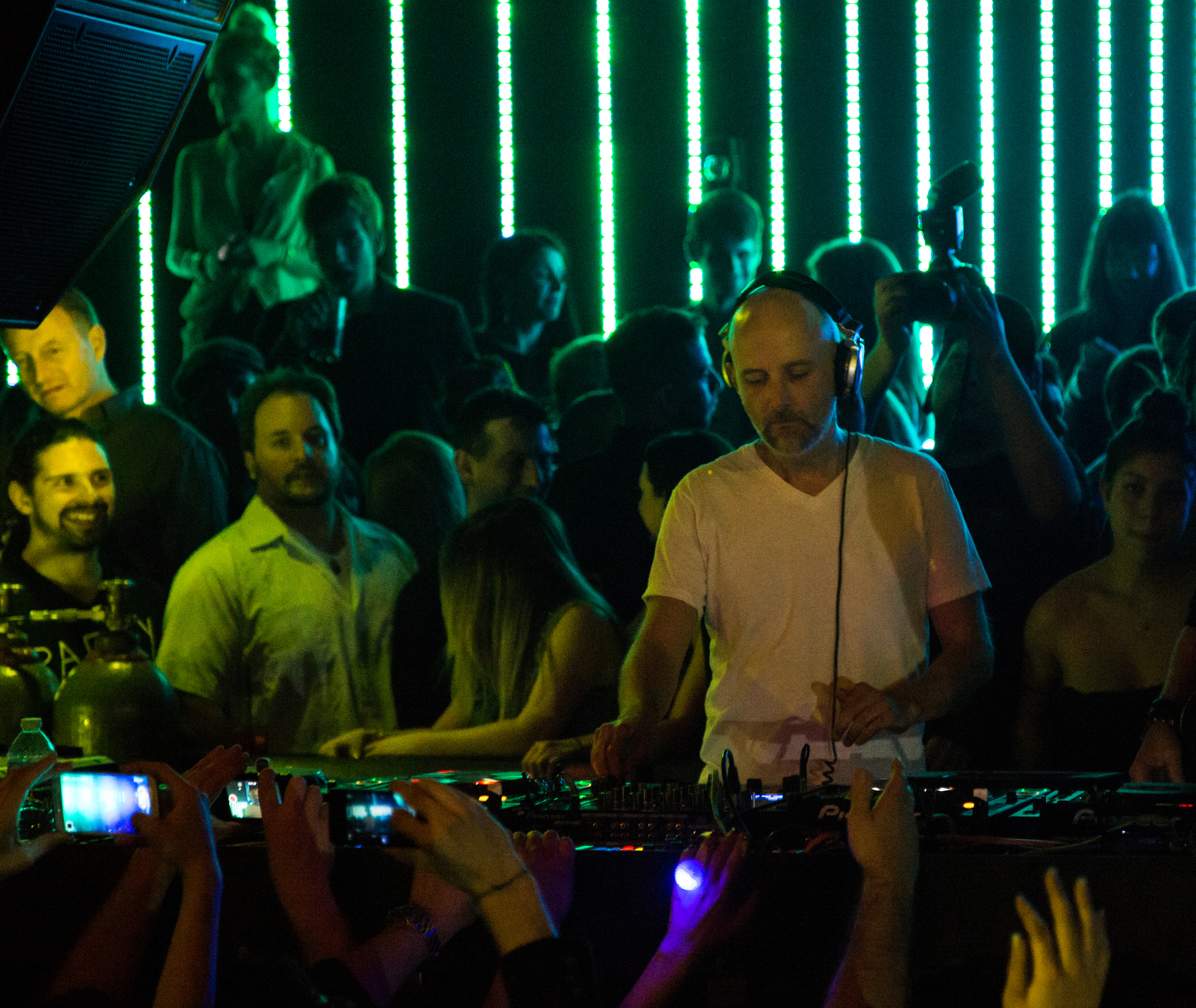
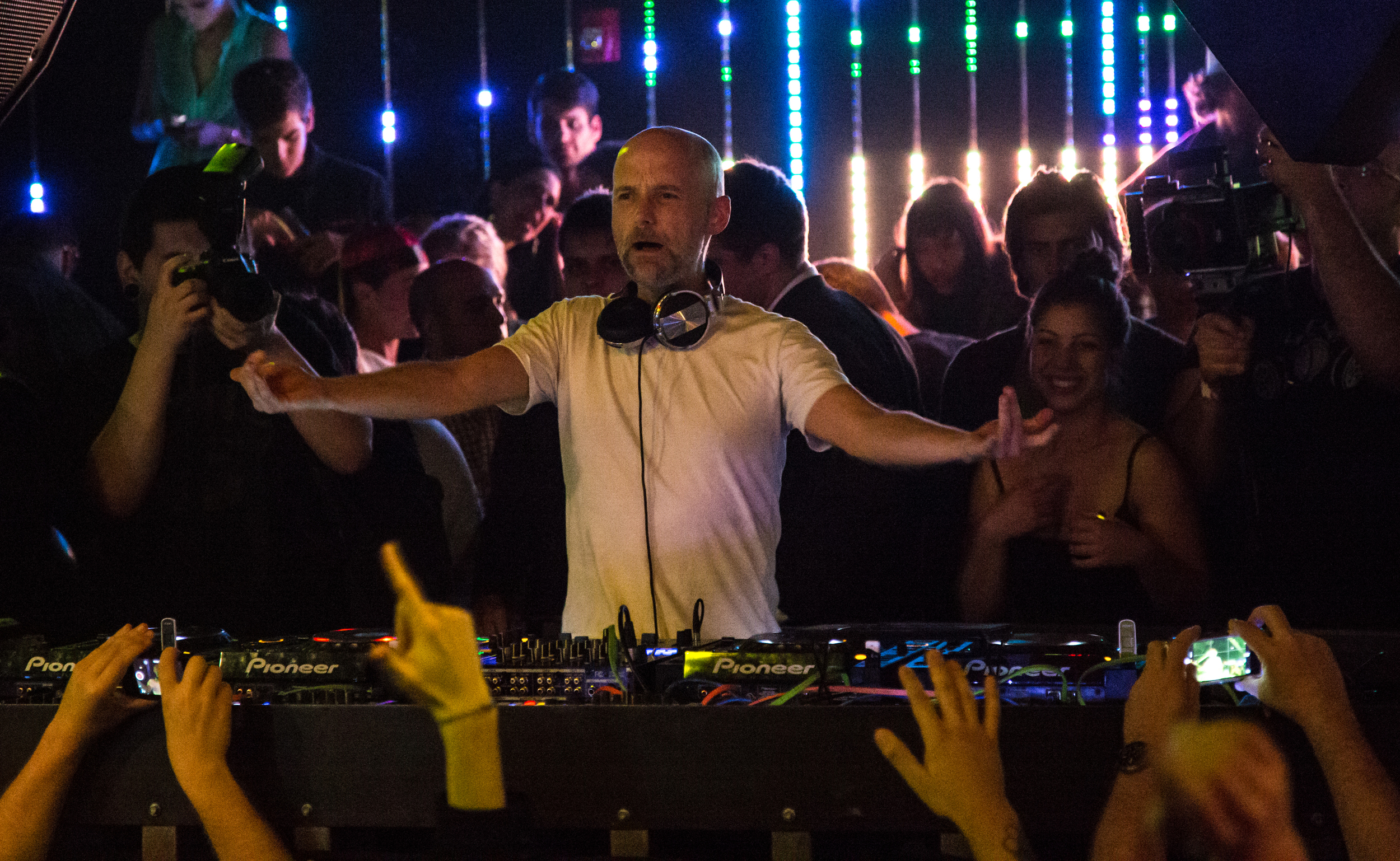
symbols Magazine: So, how are you tonight?
Moby: Very tired and not for any good reason. Basically, I tore my rotator cuff six months ago kickboxing, and I spent four or five months ignoring it and it’s just gotten really bad. So, now it keeps me from sleeping.
sM: Oh no! That’s not good.
Moby: So, night after night, I’ve been getting two or three hours’ sleep, and the accumulative effect is I kind of feel like I took mescaline.
sM: Are you having trails?
Moby: A little bit. It’s also interesting because your screen is reflected on your glasses, so I don’t notice the eyes. It’s contributing to my exhausted, psychedelic state.
sM: That’s kind of awesome! So, I was talking to Maureen outside and she was saying that the timing was perfect for this art opening this time around, as opposed to the last one where everything just kind of got clumped together. Are you enjoying the fact that you can actually space it out now and focus on the record and then the art?
Moby: I guess so. It’s funny because people don’t really buy records anymore, which is perfectly fine with me. I love making records. The last couple of albums I’ve made, I sort of made them just simply because I love making records. I don’t really expect too many people to buy them. I just love the process of making them and putting them out into the world with no expectation of what’s going to happen. In the olden days, you put out a record and you really hoped that commercial radio would get behind it, or people would buy millions of [them], and now I put it out for loving the weird, sort of benign chaos of the digital world. You put it out and just…
sM: Whatever happens…
Moby: Yeah. Whatever happens, happens. I sort of feel the similar way with having an art show. You create the work and put it out into the world, and step back and see if people respond, or if they don’t respond. It’s nice to have no expectations—to just enjoy the process, try to make something that you love. The goal is not to try and convince people to have any sort of reaction; just let the people have whatever reaction they want to have.
sM: How does it feel when they get it, as opposed to not?
Moby: Well, because, like I spend a lot of time, like with this art show, thinking about the concept behind it, shooting the images, crafting the images, editing the images, it’s really gratifying. It’s hard to get images to the place where they can be printed really big. And considering I’ve been a photographer for decades, I’m just really happy that I was able to do an okay job [of] getting the images to the point where they can be printed five [feet] by eight [feet]. I’m a little obsessive about that. I don’t want to be too crazy, just make sure it’s super clear, but still let things be a little messy, as well. It’s like finding a balance between clinical precision and a degree of softness.
sM: So, the one piece that I really love is “Second.” It looks like, like black wings in the sky.
Moby: Oh yeah. Like an angel of death swooping over L.A.
sM: What was that one about for you?
Moby: Well, the concept behind the show was that the apocalypse has happened. So, half the show is me documenting the apocalypse. I like the idea of “document,” like… instead of trying to prove to people something has happened, documenting something working under the assumption that everyone already knows it’s happened. So, you don’t need to explain. Like, it doesn’t need to be a repository; it can just be revelatory. I think it’s interesting to say, “clearly the apocalypse has happened,” even if most people would disagree; then, esthetically letting things proceed from there.
sM: Your piece “East,” it’s sort of like a mushroom cloud in a way. Is that what you were going for?
Moby: Yeah, it’s supposed to be the eye of God, which a mushroom cloud could be seen as that.
sM: So, is the art derivative of the music, or is the music derivative of the art?
Moby: That’s such a good question, and I want to have a good answer, but I don’t. People have asked me, like, “what’s the relationship between the music and the art?” I don’t know. The only answer I’ve come up with is, I moved to L.A. a few years ago, and L.A. is such a busy, un-cohesive, fantastically dysfunctional city that I feel like we all have a different response to it. One response is—I call this sort of NTR response—of the farmers’ market. Playing with a dog in the backyard and listening to Crosby, Stills, Nash and Young. I feel like the album I just made is more in that vein, where there’s a gentleness to it. And the other response to L.A. is a sort of like “step back and just look at the strangeness.” That’s what the art does. The art, like the music, is actually quite warm and inviting, and I feel like the art is supposed to be a little disconcerting and off-kilter. So, it’s two different responses to the strangeness of Los Angeles.
sM: Where does your passion lie? Which is stronger for you? Is it in the photography, or is it in the music?
Moby: I love both of them because they do such very different things. I mean, I’ve spent my entire life, the last 38 years, doing both. Music has really occupied more of my attention, but they’re so different. The reactions that they elicit in people are also very different. So, I sort of like them as separate things.
sM: Do you find that the fans you have with music are different from the ones that you have with your photography?
Moby: There’s definitely some crossover. A lot of the music I’ve made is quite warm and very pretty, and so I think some of the art that I do that’s not warm and pretty is a little disconcerting to people. There’s some people who seem to really love the quieter, warmer music that I make and it confuses them that the art isn’t in that direction.
(Two weeks later)
sM: How’s your rotator cuff issue? Still feeling as though you are on mescaline?
Moby: Yeah. Well, so here’s my middle-aged guy health complaint. Basically, I was supposed to have surgery on Friday for my shoulder and the doctor told me that my shoulder is so messed up that I can’t get surgery right now. It’s a terrible thing where the rotator cuff is all torn up, which causes a lot of inflammation. The inflammation actually prevents us from doing surgery. So, it’s sort of ironic that the pain that comes from inflammation and the inflammation [itself] is preventing the surgery that would stop the pain.
sM: So, what do you do in that instance?
Moby: Honestly, just like waiting and assuming there are some remarkable lessons to be learned from middle-age guy pain. I just don’t know what those lessons are yet.
sM: Maybe just grin and bear it?
Moby: Yeah, I think. My approach with whenever something’s wrong with me is sort of, like, get all Type A and be like a drill sergeant and push through. I’ve learned that that actually, often times, makes it worse. So, I think I’m being forced to confront, I don’t know, the quasi-frailty of being born. Sometimes, you just have to let things heal on their own.
sM: Right. Okay. Well, because we got a lot of good stuff from you during the art show, I’ll keep it as brief as possible, so you can get back to whatever you were doing.
Moby: What I’m doing, actually, is I’m shooting a video for David Lynch.
sM: Really?
Moby: He wrote a song called The Big Dream, and over the years, we’ve collaborated on a lot of things. But he wrote this song The Big Dream and I really liked it. So, then I sort of did my own weird version of it, and now he likes that, so he asked me to make a video for him. So, now I’m shooting a video of my version of one of his songs.
sM: That’s amazing.
Moby: Yeah.
sM: So, that’s got to be a huge deal.
Moby: Well, I mean, it’s just me with some weird people in my basement. Just some really odd stuff. It’s a no-budget video, but it’s just fun doing something that’s just for a response to this weird collaborative process.
sM: Okay. So, to those that are unaware of the Apocalypse of 2012 that you told us about, who are the Cult of the Innocents?
Moby: Well, for the last 2,000 years, it seems like most cults have been pre-apocalypse, like with this idea that there’s this imminent apocalypse and the cults have kind of figured out how to handle it, how to deal with it or survive, or, you know, placate the gods. And I thought it would be very interesting to have a post-apocalypse component. So, that’s the Cult of Innocents. They’re both sort of ashamed at their own humanity, and they’re ashamed at collective humanity, and so they’re trying to conceal themselves. And somehow, sort of post-apocalyptically, appease the powers that be. Powers that be on a divine level, not necessarily Congress and the House of Representatives.
sM: What do you think is next for the world as a whole? What’s next for you?
Moby: For the world as a whole, that is a good question. And if left to my own devices, I could spend the next month and a half rambling on about that. But I think in a very general sense what’s next for us, for the species, is to finally accept [our] consequences for actions. We sort of try to live in this naïve bubble, where we pretend that our actions don’t have consequences. I think, kind of like a crystal meth addict at the end of a binge, we’re being confronted with the consequences of our actions, and so I think we have to start simply behaving in a way that is keeping in line with ideally trying to prevent consequence. So, stop doing all the stupid things that we’re doing and stop wasting resources pointlessly. Stop using resources that we don’t have. Stop doing things that we know contribute to bad health, and somehow pretending that bad health isn’t going to be the result of, you know, eating McDonalds, smoking cigarettes, and drinking Mountain Dew.
sM: Right. But do you really think that society can do that or that they will? I mean, it sounds like a great outlook, but I think we’re so…
Moby: If I look at the last few thousand years, almost ever since the Magna Carta, if not before that, maybe going back to the Roman Senate or the Greek Senate, humans have been slowly moving in this direction of being more rational, more than not. You know, it’s going back to 100 years ago, women couldn’t vote, children worked in factories, blacks and whites couldn’t share drinking fountains. No one would even consider having an African American holding public office. There was no such thing as [the] Environmental Protection Agency. There [was] no such thing as civil rights. People didn’t even know that homosexuality existed, let alone the gays could get married and have TV shows.
I feel like we are moving in this more, like, benign, rational, empiric, be informed direction. But I could almost say, in a very glim, general way, there are two currents of humanity. There’s a current of people who are more inclined towards openness and progress, and then [there’s] the current of people who are more bold, adamant, very conservative, violent, status quo. And those seem to be like the two forces in our world right now. And for me, all I want to do is just, like, make music and collaborate with David Lynch.
sM: Simple things in life.
Moby: Yeah.
sM: Now, you were saying that your music and your photography both elicit different responses. And since you sit more in the pocket of music—and knowing your love for your globes—would you ever consider commissioning a globe of the earth? Like maybe something with, like, a creative landscape or an alien world that when you touch the globe, it would play some sort of audio tune of your creation? Like something along the lines of the Harmony of the Spheres? Or, even perhaps create a musical installation of several planets?
Moby: You know, I’ve never thought [about it], but hearing you talk about it, sounds really amazing. So, I might borrow that idea.
sM: That would be awesome, and you can credit me for that if you want to, you don’t have to, but…
Moby: I’m sitting here looking at my giant wall of globes right now. And one of the most interesting things that you could ever do with a globe is turn it upside down.
sM: Oh, of course.
Moby: It’s so odd. We’re so accustomed to seeing everything as a right side up; you know, a top hemisphere and a bottom hemisphere. When you turn it upside down, suddenly, it’s like this. It’s almost like André Breton could have invented it as a surrealist trick. You turn it upside down and suddenly everything that is familiar becomes so profoundly unfamiliar.
sM: Yeah. It does. This is a silly question, but I have to ask it: If one of your globes was a flavor of ice cream, what would it be?
Moby: Well, I’m looking at a really, really old globe, like 1925. And so I’m guessing it would be some flavor of ice cream that, like, our grandparents would have liked. Like butter mint peppermint stick or something. One of those flavors at Baskin Robbins that no one wanted, like pistachio mint.
sM: Oh. That’s disgusting.
Moby: You’re in Baskin Robbins and you look at all the flavors. You just look at this one flavor, it looks like, I don’t know, making out with the grandparents.
sM: Eww. So, in terms of the musical component of this part of your journey, I think it’s interesting that you explore both the themes of vulnerability and humanity. To be vulnerable is to be human and to have weaknesses. But many don’t like to reveal them to the world. In this album, it feels like you were revealing and releasing those vulnerabilities—if we as humans can look in the mirror and face those weaknesses without letting them make us feel weak. What do you think? Did you intend this for your listeners, or…?
Moby: I think [for] the health and well-being. Whether it’s creative, physical, or spiritual, you know, I could state the obvious. But it’s like in finding that balance, you know the hard and the soft, and the open and the protected, [and] the aggressive and the sort of regressive. I feel like one of the biggest problems with our culture is that finding that balance between hard and soft. We all are 98 percent in the hard category, meaning we live in this world with anger, bitterness, judgment, cynicism, criticism, belligerence—all these really hard, nasty emotions, and we just don’t spend enough time in the world of vulnerability and introspection. We don’t need to go all the way to the other extreme, but it’s finding a balance, too. Often times, my experience is the hard, as it were, really is a mask for the soft, you know? Like it seems so easy with the kids. When a little kid is angry, the truth is they’re afraid. It’s the same thing with adults. I think one of the only interesting questions any person can ever ask themselves is when they have a big emotional reaction, especially a negative one, is to ask themselves, “What’s really going on?” We have to identify with that superficial emotion or that immediate emotion without actually being introspective. What’s the underlying emotion, what’s the fear, what’s the vulnerability? I think it’s a much more interesting process. [It] certainly will serve this species better than just constantly identifying with bitterness and anger.
sM: Right. So, in an age where everything is perfected, made to look perfect by technology, you said that you intentionally made an effort to keep your work imperfect. It’s an interesting notion, considering that perfection is consistently sought after. Did you choose to do this to show a more human quality of your work, or maybe to connect with your listeners? Was it a challenge for you to see what you might be capable of?
Moby: Part of it is just intuition; it’s that subjectivity. But personally, I find myself really bored with perfection—whether it’s the technical perfection of a $200 movie or the technical perfection of a song. I just feel it’s almost like we’ve spent the last however many billions of years in this messy world trying to make perfect things, and now we live in the world and its connections to need. It’s so much easier to make a technically perfect piece of music than it is to make an emotionally vulnerable one. I mean, it’s so much easier to make a machine-created sculpture than a sculpture carved by hand that has flaws and vulnerability. So, at this point, I just find myself a lot more interested in the imperfections of humanity than the perfections of technology.
www.moby.com
www.mobydj.com
www.facebook.com/mobymusic
